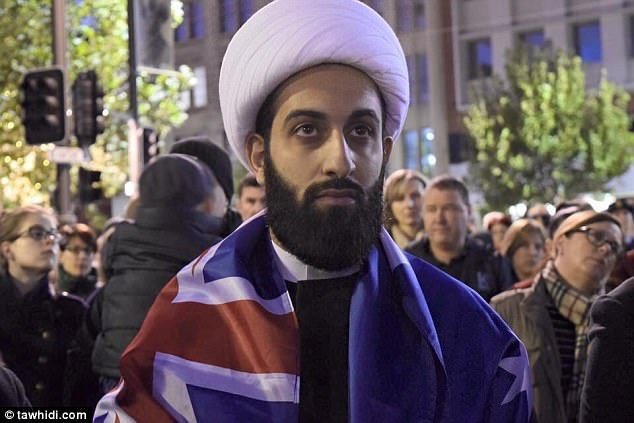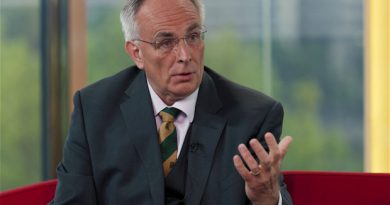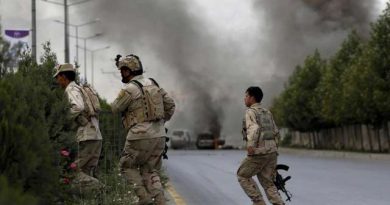Welcome to the Weird World of Australia’s ‘Fake Sheikh’, Mohammad Tawhidi
by Chloe Patton
In Tawhidi’s black-and-white worldview, anything other than the Shia Twelver Islam that he follows is the terrorist ideology.
Mohammad Tawhidi waves regally from the back of a black car marked “VIP” as it makes its way through a city street lined with hundreds of screaming, flag-waving young South Koreans uniformly clad in white.
With his gold-trimmed white robes and pointed turban, the man who calls himself both an Imam and Sheikh cuts an elegant figure as a minder guides him out of the car, past more jubilant Koreans and television cameras, and into the surreal surrounds of an Olympic stadium filled to capacity, where tens of thousands of seated spectators holding coloured cards form a gargantuan human LCD screen.
Here he is ushered to pose for photographs with other similarly well turned-out men of faith, all of whom have been flown in from religious communities across the globe to take part in the World Alliance of Religions Peace (WARP) summit.
But the cheer squads are not really here for Tawhidi, and this is not really a peace conference. These ecstatic young Koreans are members of an allegedly dangerous religious cult taking part in a highly regimented North Korean-style stadium extravaganza to pay tribute to their controversial leader, Lee Man Hee.
Welcome to the thoroughly weird world of Mohammad Tawhidi, the man the mainstream Muslim community has dubbed Australia’s “fake sheikh.”
Anointed as a religious leader by the tabloid media, this Shia extremist is using its newspapers and television programs to wage a sectarian war against Australia’s majority Sunni community. And their audiences can’t get enough.
Ayaan Hirsi Ali has called for Tawhidi to be “elevated to celebrity status” to counter the influence of Waleed Aly, who she accuses of “having a stake in a Muslim Brotherhood-type of organisation.” A skim through the headlines of the past fortnight indicates she needn’t have bothered: Tawhidi has already made it.
The enemy of my enemy …
Tawhidi first came to public attention through a series of claims about Muslims conspiring to establish a taxpayer Caliphate “right here, under our noses,” where streets would be re-named after terrorist murderers. He demanded that the Australian government ban the construction of mosques and community centres and establish a body dedicated solely to investigating Muslims.
Regaling Andrew Bolt with the horrors awaiting non-Muslim Australians under this Caliphate, Tawhidi claimed that tax evaders will be beheaded: “they put his head in a pot, they eat it, then they rape his wife that same night.” Bolt was visibly delighted when Tawhidi declared that Sahih al-Bukhari, the most sacred Sunni text after the Qur’an, must be banned. The formula was clearly a winner: Tawhidi returned to Bolt’s program the following week, this time lending support to Ayaan Hirsi Ali’s crusade to see all Islamic schools forcibly closed.
If the unusualness of a Muslim cleric aligning himself with Bolt and Hirsi Ali should provoke a close inspection of Tawhidi’s credentials as a religious leader, either none is being undertaken or the spectacle of man dressed up as a cleric delivering epithets more at home at a white nationalist rally is proving simply too good to resist.
The name of Tawhidi’s organisation – the Islamic Association of South Australia – should be an immediate indication that something is not quite right: its resemblance to the real peak representative body for South Australian Muslims – the Islamic Society of South Australia – could be seen as a ploy to derive legitimacy through mistaken identity. Deliberate or not, the Rotary Club of Adelaide was certainly taken in by it, proclaiming him to be the South Australian Muslim community’s “top man.”
Tawhidi is not recognised as an Imam or Sheikh by either the Australian National Imams Council or its South Australian equivalent, nor is he affiliated with any Australian mosque or prayer centre. The only religious instruction he offers is a self-described “university standard” Islamic Studies class delivered from a rented classroom at the University of South Australia. Course content posted online includes rambling refutations of the Big Bang and the theory of human evolution. A video he has shared on social media depicting a sparrow repeatedly fluttering against another sparrow gives a taste of his views on the latter. The caption reads: “Watch how this bird performs CPR on another bird, something we humans won’t learn without an educational training course; so who taught that bird?”
Tawhidi’s sectarian project
Unsurprisingly, Tawhidi’s tales about Sunni Muslims’ shadowy plot to instate Caliphate have been enthusiastically embraced by the far-Right, including Reclaim Australia. Perhaps less expected is the extent to which Tawhidi himself has courted such groups. In the lead-up to last year’s federal election, he made offerings of roses to roadside anti-Muslim Liberty Alliance and One Nation posters, as if the face of Pauline Hanson belonged not to Australia’s most recognisable anti-Islam campaigner, but a titian-haired deity.
While it is certainly odd for a Muslim cleric dressed in full regalia to be making such an unmistakably religious gesture towards Islamophobes, the politics behind it are not completely unheard of.
Evangelical Christian minister Danny Nalliah’s Rise Up Australia party has a substantial non-Anglo membership, yet enthusiastically embraces Reclaim Australia’s overtly racist rhetoric, including its denunciation of multiculturalism. Like Tawhidi, members of Nalliah’s group are able imaginatively to erase themselves as targets of far-Right extremism because it serves as a means to address what is, for them, a theological grievance. Never mind that when a young Sri Lankan man is bashed on a train or a Muslim woman has her hijab yanked off, the offenders do not stop to check whether he is actually Christian or she is Shi’i.
Tawhidi’s theological grievance is of a sectarian variety rarely seen in Australia, and this is perhaps part of the reason it evades scrutiny. Visually referencing Iranian posters of Iranian Ayatollahs, one of the many self-aggrandising memes posted to Tawhidi’s social media accounts depicts him in profile with the caption “Islam without Imam Ali (a.s) is simply Isis.” In Tawhidi’s black-and-white worldview, anything other than the Shia Twelver Islam that he follows is the terrorist ideology. Sunni Muslims “just want to live in the caves like they did 1400 years ago,” he told 2UE’s Ben Fordham.
While Shia Muslims may share his understanding that Imam Ali is the true inheritor of Prophet Mohammed’s legacy, the majority of Australia’s Shia community does not conflate Sunni Islam with terrorism. Tawhidi’s theological outlook places him firmly on its extremist fringes.
Paradoxically, it is precisely the genuineness of Tawhidi’s commitment to his sectarian project that fuels a public persona steeped in phoniness. And this has made him perfect fodder for even bigger phonies. Whether he was aware of it or not, when he headed to Korea for his 2016 “world peace tour,” he was about to cross paths with one of the most successful merchants of religious fakery in the world.
An “alliance into one religion”?
Established in 1984, Lee Man Hee’s Shincheonji Church of Jesus the Temple of the Tabernacle bears a strong resemblance to the better known Unification Church, popularly known as the “Moonies.” For decades, both churches have been accused of brainwashing members and creating front organisations using deception to infiltrate other churches both in Korea and the West. The peace summit Tawhidi attended was hosted by Heavenly Culture, World Peace, Restoration of Light (HWRL) and a string of peace-themed groups, all of them controlled by Lee’s Shincheonji Church. Unbeknown to the overseas invitees, the event was known within Korea not as a peace conference, but the 6th Shincheonji National Olympiad, a four yearly mega-party to celebrate Lee’s birthday.
A Korean media blackout on Shincheonji activities meant that for many invitees, the realisation that they had been co-opted into a cult leader’s elaborate vanity project only dawned on them when they walked into the stadium. Martin Bergsma, the president of a Dutch youth NGO, said he found it difficult to extricate himself once the penny dropped; HWRL had paid 80% of his airfare and kept him under tight control when he got there, he said. Other participants shared Bergsma’s experience of being pressured to sign a document declaring their submission to a single merged religion, effectively a pledge of allegiance to Lee.
Speculating on the reason for the expensive and logistically complicated charade, Bergsma believes it generated “excellent propaganda material for the South Korean people, showing that Man Hee Lee has supporters from all over the world.” The Church certainly made mileage out of the handful of attendees who did sign up to Lee’s vision of a global religion – Tawhidi included. Shincheonji have quoted him as saying, “This WARP Summit is an event blessed by God because it is every religious person’s wish to achieve peace through an alliance into one religion.”
If Tawhidi was perturbed by his name being attached to a pledge to do away with Islam, it did not show. While other attendees took to the internet to warn about the bogus event, Tawhidi instead made his involvement the centre of his public persona. Proclaiming himself “the Imam of peace,” he plastered his social media accounts with images of himself posing with fellow attendees, often making the distinctive “L” shaped hand gesture associated with the cult. He also proudly showed off his “gold medal for world peace.” There is no mention of who bestowed this honour upon him, but the medallion bears a striking resemblance to a cheap Korean good luck trinket.
Believing a lie
All of this would be amusing if not for the dogged determination of certain sections of the Australian media to further his cause without scrutiny. When Islamic television station One Path exposed Tawhidi as a fake, the evidence it presented was not only ignored, the very fact that it had investigated Tawhidi’s claim to be a Muslim leader was twisted to suggest it was persecuting him as a Shi’i.
Even a video of Tawhidi railing against Muslims who had mocked his peace-loving credentials on social media by circulating a photograph of a blood-drenched Tawhidi holding a dagger was presented as further evidence that Muslims were upset with him for exposing their Caliphate plans. (The image is likely to have been taken at a Shia tatbir ceremony, where participants self-flagellate with blades until they bleed in an annual mourning ritual.) His extraordinary accusation in the video that the Muslim community had offered him $3 million to buy his silence not only went unexamined, it was simply left out.
The only fact-checking that appears to have been carried out to date concerns Tawhidi’s most recent claim that he has been “escorted into hiding by the police.” A police spokesperson told the Australian that “there have been no incidents relating to the removal of a person from a mosque or similar place.” This did not take any of the wind out of the story’s sails, however, and other media outlets quickly went on to state it as fact.
And this is what is most disturbing about the whole Tawhidi phenomenon: in the pantomime that is media coverage of Islam and Muslims, it is far easier to be fake than real. The ridiculous spectre of 2% of the population seizing control and boiling heads in pots – disturbingly similar to Nazi propaganda about Jews cooking and eating babies – is easier to countenance than any real analysis of the dynamics shaping Islam in Australia. A giant exercise in bias confirmation, anything that does not fit the narrative is deemed to be “carrying water for the Islamists.”
The spaces where Muslims can even point this out – let alone put forward alternative views informed by genuine engagement with the community – are receding, washed away by a rising tide of paranoid nationalism. The result is a community that turns in on itself, working through its problems in the micro-public arenas of social media, student associations and community politics. While this will not result in anything like the establishment of an Australian Caliphate, it is hardly a recipe for social wellbeing.
Article first published on Australian daily abc.net.au.
Chloe Patton is a Melbourne-based researcher and writer. Her doctoral research was an ethnographic study of young Australian Shi’i Muslims. She was formerly a research fellow at the International Centre for Muslim Understanding at UniSA and at the Institute for the Study of Muslim Civilisations at the Aga Khan University, London.



